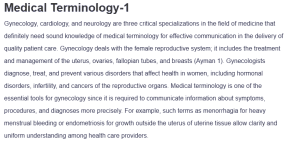Medical Terminology-1
Gynecology, cardiology, and neurology are three critical specializations in the field of medicine that definitely need sound knowledge of medical terminology for effective communication in the delivery of quality patient care. Gynecology deals with the female reproductive system; it includes the treatment and management of the uterus, ovaries, fallopian tubes, and breasts (Ayman 1). Gynecologists diagnose, treat, and prevent various disorders that affect health in women, including hormonal disorders, infertility, and cancers of the reproductive organs. Medical terminology is one of the essential tools for gynecology since it is required to communicate information about symptoms, procedures, and diagnoses more precisely. For example, such terms as menorrhagia for heavy menstrual bleeding or endometriosis for growth outside the uterus of uterine tissue allow clarity and uniform understanding among health care providers.
Subsequently, cardiology involves a number of disorders of the heart, such as coronary artery disease, heart failure, and arrhythmias. Cardiologists use specialized terminology in diagnosing and managing cardiovascular conditions (Savage et al. 2596). Terms such as myocardial infarction and angina pectoris bear special importance in the exact transmission of information regarding the patient’s condition. Detailed knowledge of terminology enables cardiologists to make sense of test results, document findings accurately, and communicate treatment plans within multidisciplinary teams.
Furthermore, neurology deals with the neurological system, which consists of the brain, spinal cord, and peripheral nerves (Bassetti et al. 2). Thus, neurologists diagnose and treat disorders related to epilepsy, stroke, and Parkinson’s disease. Accurate medical terminology in neurology is very important because it helps describe complicated conditions and communicate neurological functions, symptoms, and treatments with precision. Conditions like aphasia – the ability of speech loss and hemiparesis – weakness on one side of the body make patient evaluation and treatment plans more specific.
Professional resources such as MedlinePlus, Merriam-Webster Medical Dictionary, and Medscape are good sites to search for medical terms related to one’s field of specialization. The definitions, case studies, and articles on such sites give one more profound insight into the subject matter and aid in caring for the patient.
Works Cited
Ayman A. A. Ewies. “The Journal of Obstetrics and Gynaecology – a New Era.” Journal of Obstetrics and Gynaecology, vol. 43, no. 1, Informa, May 2023, https://doi.org/10.1080/01443615.2023.2214450. Accessed 9 Apr. 2024.
Bassetti, Claudio Lino, et al. “General neurology: Current challenges and future implications.” European Journal of Neurology, vol. 31, no. 6, 28 Mar. 2024, https://doi.org/10.1111/ene.16237.
Savage, Patrick, et al. “Advances in Clinical Cardiology 2022: A Summary of Key Clinical Trials.” Advances in Therapy, vol. 40, no. 6, Springer Science+Business Media, Apr. 2023, pp. 2595–2625, https://doi.org/10.1007/s12325-023-02502-4.
ORDER A PLAGIARISM-FREE PAPER HERE
We’ll write everything from scratch
Question
The purpose of this discussion forum is to create a collaborative environment in which you can strengthen your use of medical terminology and critical thinking skills while constructively sharing ideas and opinions regarding medical ideas and scenarios. Initial posts are due Thursday and peer responses are due Sunday.
1. Topic: Name 3 medical profession specializations you have learned about so far from your textbook. How do they relate to healthcare and why do they need to know medical terminology? Suggest some websites as additional resources for individuals in healthcare that can use the site to refer to medical terms related to their area of specialization or healthcare in general.

Medical Terminology-1
Client’s Notes:
- The 3 medical profession I chose are : Gynecology, Cardiology, and Neurology

